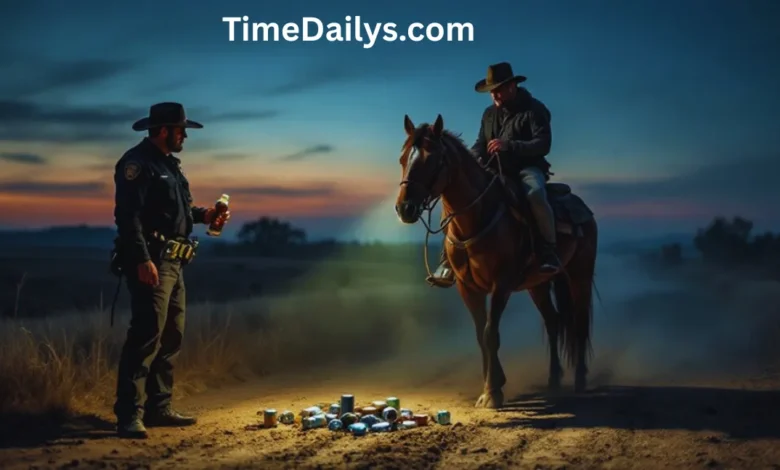
Can You Get a DUI on a Horse? Let’s Set the Record Straight
You’ve likely heard the bizarre rumour or seen a meme online, someone riding a horse home from the pub to avoid a drink-driving charge. But can you get a DUI on a horse? It might sound absurd, but the answer isn’t as simple as “yes” or “no”.
In this article, we’re going to break down the law, country by country, and explain the surprising legal grey areas involved. We’ll also explore the reasoning behind these rules and what you should know before saddling up after a few drinks.
What Exactly Is a DUI?
Understanding DUI Laws and Their Purpose
A DUI, or Driving Under the Influence, is a legal offence that typically involves operating a motor vehicle while impaired by alcohol or drugs. The laws exist to protect everyone on the road, drivers, passengers, and pedestrians alike.
While it’s clear that drink-driving in a car is illegal, things get murkier when it involves non-motorised transport. Horses, bicycles, scooters, each country treats these differently under the law.
Can You Get a DUI on a Horse in the UK?
What British Law Says
In the United Kingdom, the law regarding drink-driving is mostly focused on mechanically propelled vehicles. That means cars, motorbikes, vans, and even e-scooters fall under the legislation.
However, Section 12 of the Licensing Act 1872 makes it an offence to be drunk while in charge of a horse on a public highway. The law states:
“Every person who is drunk while in charge of any carriage, horse, cattle or steam engine upon any highway or other public place… shall be liable to a fine or imprisonment.”
So, yes, you can be arrested and charged for riding a horse while drunk in the UK. While it’s technically not a DUI under the Road Traffic Act 1988, it’s still a criminal offence.
Penalties
The consequences may include:
- A fine
- A criminal record
- In serious cases, up to 51 weeks in prison
What About the United States?
The Legal Maze Across States
In the United States, DUI laws vary from state to state, and the treatment of horses adds to the confusion.
Some states define a “vehicle” broadly enough to include any mode of transport, while others specifically restrict DUIs to motor vehicles.
Examples:
- California: You can be charged with a DUI while riding a horse, though in practice, charges may fall under public intoxication or animal endangerment instead.
- Kentucky: You cannot be charged with a DUI on a horse, but you can be arrested for public drunkenness.
- Colorado: Yes, a horse can be considered a vehicle for the purposes of DUI.
In short, can you get a DUI on a horse in the U.S.? It depends entirely on where you are.
Canada: Riding Under the Influence
Criminal Code & Provincial Rules
In Canada, the Criminal Code prohibits impaired driving of motor vehicles, so riding a horse drunk doesn’t typically qualify as a DUI under federal law.
However, several provinces have laws around public safety and intoxication, which means you could still face fines or even arrest.
For instance:
- Alberta and Ontario may issue tickets for being intoxicated in public.
- If the horse causes a road hazard, you might be charged under traffic safety regulations.
Australia: Yes, You Can Be Charged
Aussie Law Doesn’t Let Riders Off the Hook
In Australia, several states include horses under DUI-style laws. For example, in New South Wales, riding a horse while under the influence is a criminal offence, similar to drink-driving a vehicle.
Police have the right to breathalyse riders, and penalties may include:
- Hefty fines
- Criminal charges
- Potential disqualification from holding a driver’s licence (yes, even though you’re on a horse)
So if you’re asking can you get a DUI on a horse in Australia, the answer is a clear yes.
Why Is Riding a Horse While Drunk Dangerous?
It’s Not Just About You
Even though horses are intelligent animals, they’re still animals. Riding while drunk can lead to:
- Loss of control over the horse
- Injury to pedestrians or drivers
- Road accidents, especially in urban areas
- Harm to the horse itself
Plus, being intoxicated makes it harder to interpret road signals, maintain balance, or respond to emergencies.
Alternatives to Riding Home Drunk
Smarter, Safer Options
If you’ve had too much to drink and can’t drive:
- Call a taxi or rideshare service
- Use public transport
- Ask a sober friend for a lift
- Walk (if it’s safe and legal to do so)
And if you’re in charge of a horse, call someone to help or stable the horse overnight. It’s simply not worth the risk, to your safety or your criminal record.
FAQs
Can you get a DUI on a horse in the UK?
Yes. In the UK, you can be charged under the Licensing Act 1872 for being drunk in charge of a horse on a public road. While it’s not a DUI in the technical sense, it’s still a criminal offence.
Can you get a DUI on a horse in the US?
It depends on the state. Some states treat horses as vehicles for DUI laws, while others may charge you with public intoxication or endangerment instead.
Is riding a horse drunk dangerous?
Absolutely. Even if it’s legal where you are, riding a horse drunk is dangerous for you, the horse, and others. It can lead to injury, accidents, and legal trouble.
What’s the penalty for riding a horse while drunk?
Penalties vary, but you could face:
- Fines
- Arrest
- A criminal record
- Animal welfare charges in severe cases
Final Thoughts: Can You Get a DUI on a Horse?
So, can you get a DUI on a horse? The answer depends on where you live, but in many places, yes, you can.
Even in jurisdictions where a horse doesn’t qualify as a “vehicle,” you could still face other legal consequences like fines, public intoxication charges, or even animal welfare violations.
It might sound like a harmless or quirky idea, but riding under the influence is dangerous for both rider and horse. Whether the law calls it a DUI or not, the smart choice is always to avoid riding drunk.If you’re ever in doubt, speak with a solicitor or legal expert in your area. And next time you fancy a few pints, maybe leave the reins behind.




